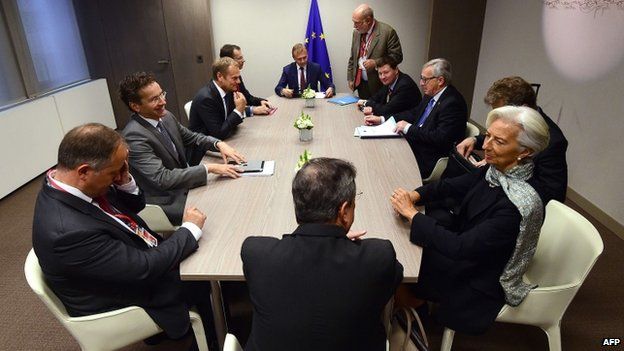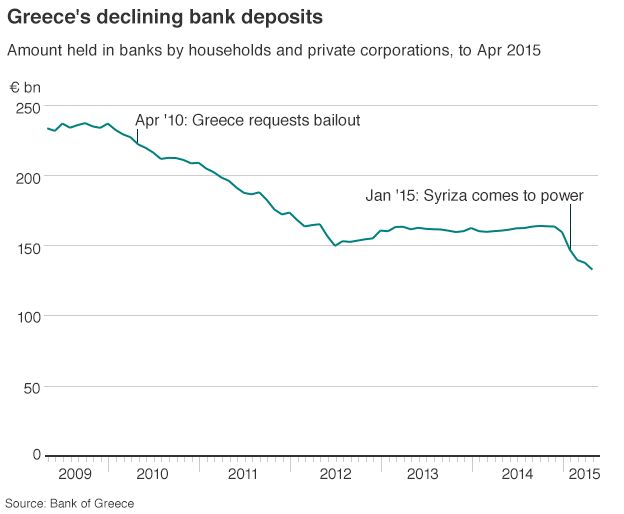Greece’s economy minister has spelled out the terms of new proposals to end deadlock on its debt crisis, amid hopes a deal can now be struck this week.
It includes new taxes on businesses and the wealthy, Giorgios Stathakis told the BBC in an exclusive interview.
Eurozone finance ministers have welcomed the plan, saying there could be a deal “within days”.
Greece will default if it does not repay a €1.6bn (£1.1bn) IMF loan by the end of the month.
If that happens, it risks crashing out of the single currency and possibly the EU.
Mr Stathakis told the BBC’s Robert Peston he was confident Greece’s new proposals to balance the government’s books had broken the deadlock with its creditors.
He said the proposals also included an increase in the VAT rate for some selected items.
Analysis – Robert Peston, BBC economics editor
Greece’s economy minister Giorgios Stathakis told me that his Syriza government, led by Alexis Tsipras, had avoided crossing its red lines with the new proposals.
So, he said, there would be no further reductions in pensions or public-sector wages. And there would be no increase in VAT on electricity.
He also said that the government had agreed with the IMF and eurozone governments that the targeted budget surplus would be 1% of GDP or national income this year, 2% next year and 3% the year after.
There will be no agreement with creditors to cut Greece’s massive burden of debt, despite Syriza’s earlier insistence on this. But Mr Stathakis told me he expects eurozone government heads to issue a communique later saying that debt relief will be on the agenda for negotiation in coming months.
An emergency Eurogroup summit in Brussels is still due to go ahead later on Monday.
Talks have been in deadlock for five months. The European Commission, the IMF and the European Central Bank (ECB) are unwilling to unlock the final €7.2bn tranche of bailout funds until Greece agrees to economic reforms.

Leaders of Greece’s creditors – the ECB, IMF, European Commission and European Council – met to discuss strategy before Monday’s summit
Separately, the European Central Bank (ECB) again increased its emergency funding for Greek banks after anxious savers withdrew more than €4bn in recent days.
Greek PM Alexis Tsipras, who has ruled out pension cuts, higher power rates, and an excessive budget surplus, said he hoped Greece would “return to growth within the eurozone”.
He met the heads of Greece’s three international creditors in Brussels, ahead of his talks with the leaders of 18 other eurozone nations.
‘Broad and comprehensive’
But eurozone finance ministers said they were not given enough time to study them for a proper assessment, amid confusion over different versions of the Greek proposals submitted.
Speaking after the meeting, Mr Dijsselbloem described the proposals as “broad and comprehensive”, but said work was needed to check they added up “in fiscal terms”.
Earlier, Germany’s Wolfgang Schaeuble told reporters he had not seen anything new from Greece so far and “without anything new, there is nothing for the ministers to prepare for their leaders”. The Irish and Finnish finance ministers echoed the sentiment.
News of a possible breakthrough gave a boost to European stock markets, with Greece’s main stock exchange jumping 9% by the end of trading on Monday.
The deadline for Greece to pay back a slice of its loan is 30 June, but a last-minute deal would make it difficult to arrange the logistics of transferring the money.
A separate European Council summit is scheduled for Thursday and Friday, and its agenda is packed.

Greek debt talks: Main sticking points
- Greece will not accept cuts to pension payments or public sector wages, saying two-thirds of pensioners are either below or near the poverty line
- International creditors want pension spending cut by 1% of GDP – it accounts for 16% of Greek GDP. They say they want to target early retirement, not lower-income pensioners
- EU officials say Greece has agreed to budget surplus targets of 1% of GDP this year, followed by 2% in 2016 and 3.5% by 2018; Greece says nothing is agreed until everything is agreed
- Creditors also want a wider VAT base; Greece says it will not allow extra VAT on medicines or electricity bills
- Greece complains creditors focus on increasing taxes instead of cracking down on tax evasion; IMF is concerned Athens is not offering credible reforms
Business live: Latest from Greece
Stock markets rise on hopes of deal
Walker: The options for Greece

BBC
 Q FM Africa's Modern Radio
Q FM Africa's Modern Radio